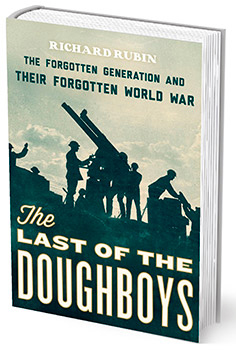
This title is both symbolic and a promise, maybe. After five years of trying to write a history of very early Greenville and satisfy my obsession with the “whys” of World War I, I am ready to settle down enough to renew another interest. I hope to have the Greenville book to the publisher by summer. I have told myself enough is enough about WWI.
But I must share a wonderful book I just completed reading. The Last of the Doughboys was written by Richard Rubin, who shared a similar interest with me. We both knew someone who served in that war years ago. While I sat and listened to my grandfather, Rubin chased down every veteran to be found . . . beginning in 2003. His was an incredible feat. The Veteran’s Administration had no lists of WWI vets at that time, the only lists he found were several years old when France honored the Americans who helped save their country.
Gradually Rubin began to hear of others, still living, that he might interview. There is a trick to oral history interviews, and Richard Rubin was super. He had a knack for storytelling. Plus, his lifelong interest in the Great War gave him an adequate background for a great book.
Rubin admits interviewing older people can be a challenge. But he persevered. And with each interviewee, he became more adept. Rubin was inspired at an Armistice Day Parade in Orleans, Massachusetts in 2003. Riding in a parade car was Corporal Jesse Laurence Moffitt, a bona fide World War I veteran. After the parade, Rubin spoke with Moffitt and was quickly got hooked on his new project.
Rubin criss-crossed the United States interviewing dozens of men and women who had played a role in the war. For many it was the first time away from home, first time on a train or ship, first time in a foreign country with numerous languages spoken. Many left school in fifth or sixth grade to help support their family. Several were fatherless by age three or four. Life was tough even before the war. Rubin noted how all but one of the veterans were “stoic” after the horrors of war. That one never saw battle on the Front Line.
One man told of sitting on a rock with a buddy when the Germans began shelling them. The buddy was killed, and the man was unscathed. A frequent tale was the rain and mud. They slept in muddy marshes, walked along trails full of water, and always needed more blankets. But they survived the German guns, the miserable conditions, the monotony of food, and even Influenza that spread around the world.
None of the women went abroad, they went to Washington, D. C. where they took the jobs of men on their way to the Front Line. As soon as news of the Armistice reached Americans, the women were out of jobs. But all vigorously celebrated the Armistice at 11:00 A.M. on November 11, 1918.
Rubin interviewed members of 92nd and 93rd Regiments, a segregated group of African Americans who were treated as manual laborers. Few reached the Front Lines, but those who did performed outstanding feats.
Richard Rubin was not only a World War I Buff, but a connoisseur of old phonographs and records. By this time, he had developed a deep interest in music created in Tin Pan Alley until the 1920s. His lengthy bibliography and experience at The New Yorker added to a most unique piece of work. It presents a great, short appraisal of the U. S. involvement in World War I. I highly recommend The Last of the Doughboys.
